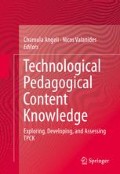Abstract
In this chapter, the authors contend that in an era in which technology applications and usage have exploded; technology integration has not been fully realized. They begin the chapter by providing a brief description of a critical time period from the 1980s to 1990s, when computer technology use exploded in classrooms and educational settings. They explain that during this time, the quest for technology integration got side-tracked, taking the path toward technology skills professional development rather than a more essential route toward student learning. They then present some of the research from the 1990s that examined the impact of technology on learning, eventually serving as a catalyst for the development of the TPACK framework. Finally, they summarize their own work, in which pedagogical knowledge has emerged as the key factor in promoting technology integration that supports transformative learning and teaching practices, and conclude with recommendations for professional practice.
Access this chapter
Tax calculation will be finalised at checkout
Purchases are for personal use only
References
Blin, F., & Munro, M. (2008). Why hasn’t technology disrupted academics’ teaching practices? Understanding resistance to change through the lens of activity theory. Computers & Education, 50(2), 475–490.
Clark, R. E. (1983). Reconsidering research on learning from media. Review of Educational Research, 53, 445–449. doi:10.3102/00346543053004445.
Clark, R. E. (1994). Media will never influence learning. Educational Technology Research and Development, 42(2), 21–29. doi:10.1007/BF02299088.
Cuban, L. (2003). Oversold and underused: Computers in the classroom. Boston, MA: Harvard University Press.
Doering, A., Scharber, C., Miller, C., & Veletsianos, G. (2009). GeoThentic: Designing and assessing with technology, pedagogy and content knowledge. Contemporary Issues in Technology and Teacher Education [Online serial], 9(3), 316–336.
Harris, J. (2008). TPCK in-service education: Assisting experienced teachers’ “planned improvisations”. In AACTE Committee in Innovation and Technology (Ed.), Handbook of Technological Pedagogical Content Knowledge (TPCK) for educators (pp. 251–271). New York: Routledge.
Harris, J. & Hofer, M. (2009). Instructional planning activity types as vehicles for curriculum-based TPACK development. Research Highlights in Technology and Teacher Education 2009, 99-10.
Herrington, J., Herrington, A., Mantei, J., Olney, I., & Ferry, B. (2009). New technologies, new pedagogies: Mobile learning in higher education. Wollongong, NSW: University of Wollongong. Retrieved from http://ro.uow.edu.au/newtech/
Hilton, J., III, Graham, C., Rich, P., & Wiley, D. (2010). Using online technologies to extend a classroom to learners at a distance. Distance Education, 31(1), 77–92.
Koehler, M. J., & Mishra, P. (2005). What happens when teachers design educational technology? The development of technological pedagogical content knowledge. Journal of Educational Computing Research, 32(2), 131–152.
Mishra, P., & Koehler, M. J. (2006). Technological pedagogical content knowledge: A new framework for teacher knowledge. Teachers College Record, 108(6), 1017–1054.
Mishra, P., & Koehler, M. J. (2010). TPACK reference library. Retrieved from http://www.tpack.org/tpck.index.php?title=Reference_Library
Mishra, P., Koehler, M. J., & Henriksen, D. (2011). The seven trans-disciplinary habits of mind: Extending the TPACK framework towards 21st century learning. Educational Technology, 11(2), 22–28.
National Commission on Excellence in Education. (1983). A nation at risk: An imperative for educational reform. Retrieved from http://datacenter.spps.org/uploads/SOTW_A_Nation_at_Risk_1983.pdf
Okojie, M., Olinzock, A., & Okojie-Boulder, T. (2006). The pedagogy of technology integration. Journal of Technology Studies, 32(2), 66–71.
Polly, D., & Barbour, M. (2009). Developing teachers’ technological, pedagogical, and content knowledge in mathematics. In I. Gibson et al. (Eds.), Proceedings of Society for Information Technology & Teacher Education international conference 2009 (pp. 4128–4131). Chesapeake, VA: AACE.
Saettler, P. (2004). The evolution of American educational technology (2nd ed.). Charlotte, NC: Information Age Publishing, Inc.
Schacter, J. (1999). The impact of educational technology on student achievement: What the most current research has to say. Santa Monica, CA: Milken Exchange on Education Technology. Retrieved from http://www.mff.org/pubs/ME161.pdf
Shulman, L. (1986). Those who understand: Knowledge growth in teaching. Educational Researcher, 15(2), 4–14.
Shulman, L. (1987). Knowledge and teaching: Foundations of the new reform. Harvard Educational Review, 57(1), 1–22.
Spector, J. M., Merrill, M. D., Van Merrienboer, J., & Driscoll, M. P. (Eds.). (2007). Handbook of research for educational communications and technology. New York, NY: Routledge.
Tamim, R. M., Bernard, R. M., Borokhovski, E., Abrami, R. M., & Schmid, R. F. (2011). What forty years of research says about the impact of technology on learning: A second-order meta-analysis and validation study. Review of Educational Research, 81(1), 4–28.
The Thomas Edison Papers. (2012). Rutgers University. Retrieved from http://edison.rutgers.edu/connect.htm
Veletsianos, G. (2011). Designing opportunities for transformation with emerging technologies. Educational Technology, 51(2), 41–46.
Author information
Authors and Affiliations
Corresponding author
Editor information
Editors and Affiliations
Rights and permissions
Copyright information
© 2015 Springer Science+Business Media New York
About this chapter
Cite this chapter
Kushner Benson, S.N., Ward, C.L., Liang, X. (2015). The Essential Role of Pedagogical Knowledge in Technology Integration for Transformative Teaching and Learning. In: Angeli, C., Valanides, N. (eds) Technological Pedagogical Content Knowledge. Springer, Boston, MA. https://doi.org/10.1007/978-1-4899-8080-9_1
Download citation
DOI: https://doi.org/10.1007/978-1-4899-8080-9_1
Published:
Publisher Name: Springer, Boston, MA
Print ISBN: 978-1-4899-8079-3
Online ISBN: 978-1-4899-8080-9
eBook Packages: Humanities, Social Sciences and LawEducation (R0)

